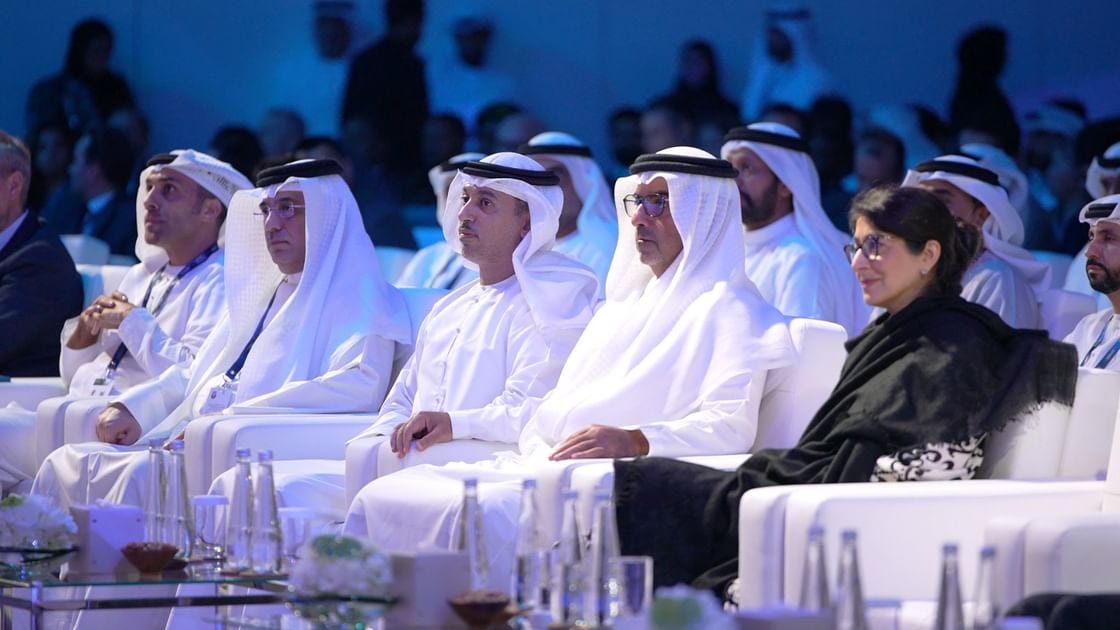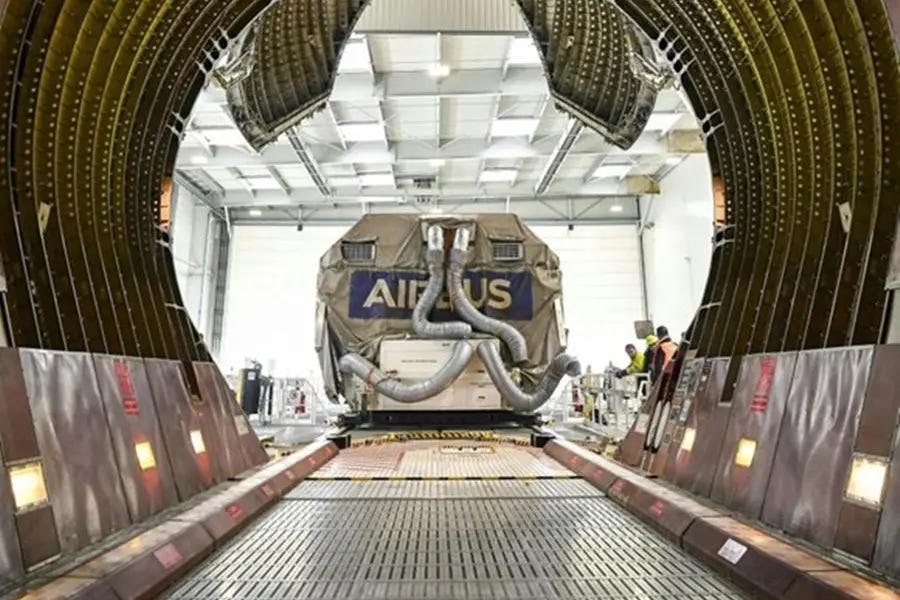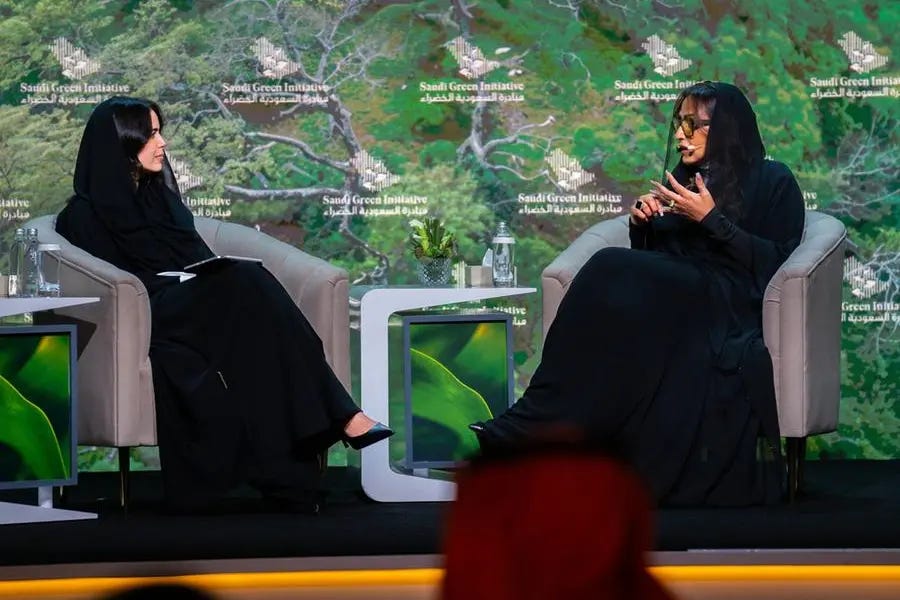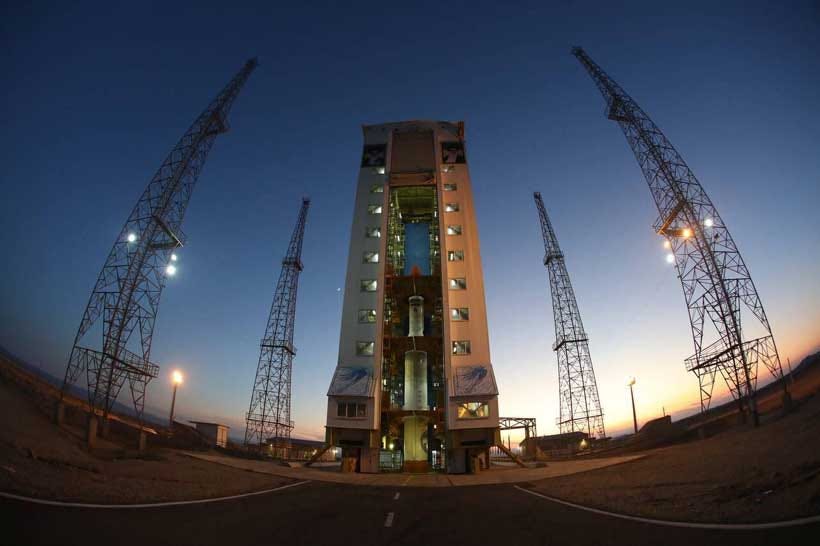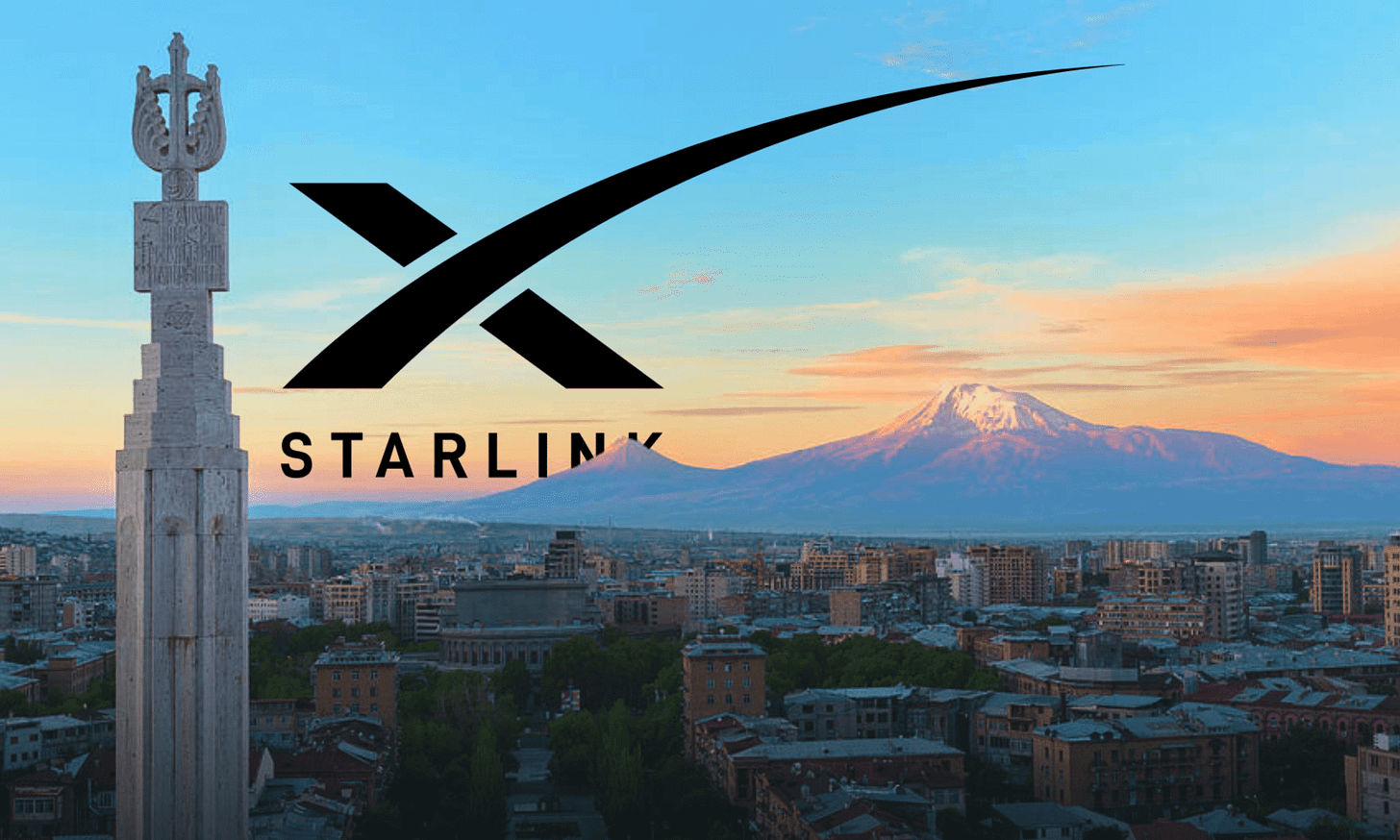Middle East Space Roundup: 9 to 15 December 2024
A summary of all the space news in the Greater Middle East over the past week, brought to you by AzurX
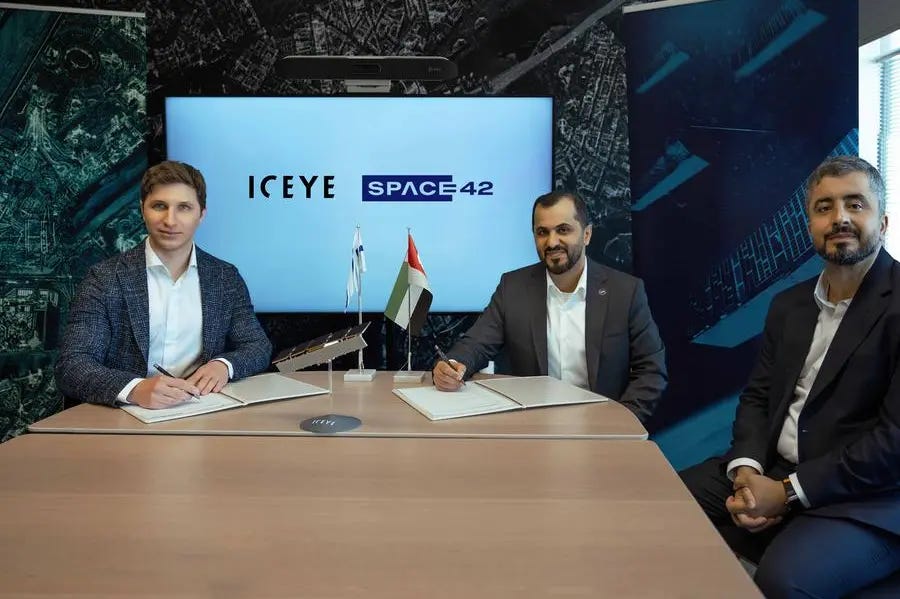
The following are the major space developments in the Greater Middle East region tracked by Middle East Space Monitor over the past week:
UAE Space Developments
UAE’s Space42 and Finland’s ICEYE Form JV to Manufacture SAR Satellites in Abu Dhabi
Space42, the UAE-based AI-powered space technology company, and ICEYE, Finland’s leader in synthetic aperture radar (SAR) satellite operations, have announced a joint venture to manufacture SAR satellites in the UAE. This partnership, which builds on the successful launch of the UAE’s first SAR satellite, Foresight-1, in August 2024, aims to enhance the UAE's Earth observation (EO) programme and address the increasing demand for high-resolution SAR imagery. The venture will establish manufacturing operations in Abu Dhabi, fostering a local SAR ecosystem and supporting UAE’s space ambitions. Additionally, the initiative promotes technology transfer, knowledge sharing, and the development of a sovereign SAR capability, while supporting Emiratization efforts by involving local talent in innovation and economic growth. This collaboration strengthens both Space42’s and ICEYE’s local presence and contributes to the UAE’s growing space and SAR capabilities.
Abu Dhabi Space Debate Addresses Space Debris, Sustainability, and Security
The 2024 edition of the Abu Dhabi Space Debate (ADSD) brought together global policymakers, industry leaders, and experts from academia and emerging space players to discuss critical space industry issues, under the patronage of UAE President Sheikh Mohamed bin Zayed Al Nahyan. Notable attendees included senior figures such as Dr. Josef Aschbacher, Director General of the European Space Agency, and Brian Cox, CERN Physicist, who participated in discussions on space technologies' role in global security, environmental stewardship, and equitable access to space resources. Key announcements included an MoU between the UAE and ESA to advance collaborative space exploration. Panels addressed challenges like space debris and the intersection of microgravity research with biotechnology, highlighting the importance of public-private partnerships and international cooperation in creating a sustainable space economy. ADSD also emphasised the growing influence of space technologies on Earth’s societal benefits, with organisations like EDGE Group, Thales, and Viasat supporting the event’s goals.
Abu Dhabi Space Debate: Experts Discuss Medical Advancements in Space
At the Abu Dhabi Space Debate, experts explored the potential of space as a laboratory for medical advancements, particularly in regenerative medicine. The discussion highlighted how the International Space Station (ISS) is emerging as a hub for tissue engineering, with groundbreaking research underway in creating meniscus and cardiovascular tissue in microgravity. These developments could revolutionise treatments for joint and heart conditions, offering new hope for age-related health issues. Mike Gold, Chief Growth Officer of Redwire Space, emphasised the immense potential of spaceflight in biotechnology, envisioning the eventual creation of whole organs in space, eliminating organ shortages and rejection issues. Additionally, Gold discussed the role of space in sustainability, suggesting that orbital debris could be repurposed for fuel and construction, turning challenges into opportunities. On the geopolitical front, Gold praised the UAE's leadership in advancing space exploration through the Artemis Accords, particularly its emphasis on inclusivity, which has contributed to the agreement's success with 48 signatories.
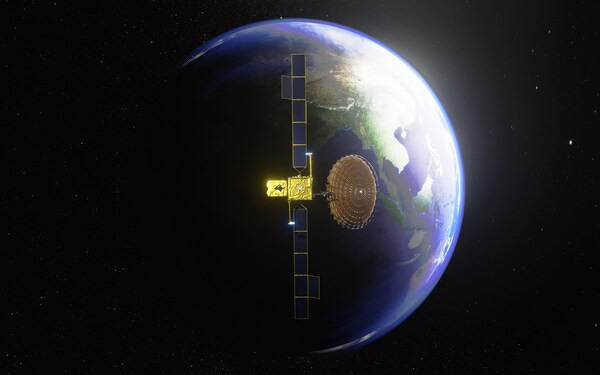
Viasat Demonstrates Direct-to-Device Satellite Connectivity in the UAE
Viasat has successfully demonstrated direct-to-device (D2D) satellite connectivity for the first time in the UAE, showcasing its ability to send satellite-enabled two-way and SoS messages at the Abu Dhabi Space Debate. This demonstration marks Viasat's third successful showcase this quarter, following similar events in India and Saudi Arabia. The demonstration utilised a commercial Android smartphone with non-terrestrial network (NTN) connectivity, enabling messages to be sent via Viasat’s L-band satellites. D2D technology, which follows 3GPP release 17 standards, allows devices such as mobile phones, cars, and industrial machinery to seamlessly connect to both satellite and terrestrial networks without requiring additional hardware. This breakthrough highlights the potential of satellite-enabled D2D connectivity to enhance global network accessibility, particularly in underserved regions, by providing reliable communication during terrestrial service disruptions.
UAE Space Agency Hosts UAE-Japan Space Sector Workshop
The UAE Space Agency hosted a UAE-Japan Space Sector Workshop during the 2024 Abu Dhabi Space Debate, fostering collaboration between experts, industry leaders, and government officials from both countries in space exploration and the satellite industry. The workshop aimed to strengthen bilateral ties in the space sector, with opening remarks delivered by key figures, including Shihab Al Faheem, UAE Ambassador to Japan, and Ken Okaniwa, Japan's Ambassador to the UAE. This event highlighted the growing cooperation between the UAE and Japan, underscoring their shared commitment to advancing space exploration and technology.

UAE’s MBRSC to Select Prime Contractor for Lunar Gateway Airlock
The UAE’s Mohammed bin Rashid Space Centre (MBRSC) is advancing its role in NASA’s Gateway lunar station project by seeking partners for the development of an airlock module, a critical component that will provide entry and exit points for astronauts and cargo. The airlock module, set to launch by 2030, is part of a collaborative effort involving the UAE, Japan, the European Space Agency, and the Canadian Space Agency. In addition to this, MBRSC is progressing with other ambitious projects, including the Rashid lunar rovers and the MBZ-Sat Earth observation satellite, scheduled for launch in January 2025. The UAE’s commitment to the Artemis Accords and its proactive approach to space governance was also emphasized at the Abu Dhabi Space Debate, where discussions on space sustainability and debris management were central. This marks a significant moment in the UAE's growing space ambitions, positioning the country at the forefront of international space collaboration and innovation.
Executive: UAE Astronauts Could be Carrying Out Missions on Private Space Stations
Vast Space, a California-based company developing two space stations in low-Earth orbit, sees the UAE as a key partner for its emerging commercial space ventures. The company is targeting the UAE’s growing human spaceflight programme for potential seats on its Haven-1 space station, which could serve as a replacement for the retiring International Space Station (ISS). Vast Space is competing with other companies like Axiom Space for opportunities in NASA’s Private Astronaut Mission programme, which would allow it to send astronauts, potentially from countries like the UAE and Saudi Arabia, to the ISS. The UAE's strong track record in space exploration, including partnerships with NASA and Axiom Space, positions it as an ideal candidate for such collaborations. As the commercial space station market expands, driven by companies like Blue Origin and Voyager Space, Vast Space aims to launch Haven-1 before the end of next year to establish its operational capability. With the ISS’s retirement approaching, the UAE is also actively developing lunar and Mars mission capabilities, including contributing an airlock module for NASA’s Gateway station, ensuring its continued participation in space exploration beyond low-Earth orbit.
U.S. Chamber of Commerce Leads First Space Sector Business Mission to the UAE
The U.S. Chamber of Commerce led its first-ever space sector business mission to the UAE, engaging with key Emirati officials and business leaders to explore opportunities for American companies in the growing space economy. The delegation, certified by the U.S. Department of Commerce, included over 20 companies and 40 business leaders. Discussions centered on strengthening bilateral space cooperation, with U.S. companies poised to bring innovation and investment to the UAE’s rapidly diversifying economy. The mission featured high-level meetings with UAE government officials, leadership from prominent space entities like the UAE Space Agency, AzurX, and Space42, and a tour of the Mohammed Bin Rashid Space Centre (MBRSC). Supported by the U.S. government, including Ambassador Martina Strong and EXIM Bank President Reta Jo Lewis, the mission underscores the expanding collaboration between the U.S. and UAE in space exploration, technological development, and innovation. This initiative highlights the strategic role of U.S. businesses in shaping the future of the UAE’s space sector.
Report Claims Airbus Front Runner in UAE Earth Observation Tender
The often unreliable Tactical Reports claims that the UAE Armed Forces are evaluating technical proposals from Airbus Defence and Space and Thales Alenia Space for a new batch of Earth observation satellites, following a tender issued in July 2024. The UAE has requested one very high-resolution satellite with a 25 cm resolution and four high-resolution satellites with a 50 cm resolution. Airbus, a frontrunner, has proposed a modified version of its Neo Pléiades satellite and four CO3D payloads, offering a comprehensive package that includes satellite manufacturing, ground systems, and AI-powered analytics for enhanced image processing. Thales Alenia Space has submitted a proposal featuring an updated Falcon Eye satellite but has yet to detail the additional 50 cm resolution payloads. Emirati President Sheikh Mohammed Bin Zayed is reportedly personally overseeing the tender process, with Airbus receiving praise for its efficient and tailored response. The final decision will consider technical performance, cost-effectiveness, and strategic partnership advantages, with the goal of supplementing and eventually replacing the UAE’s existing satellite assets under the Falcon Eye contract.
Airbus Delivers UAE’s Thuraya-4 Communications Satellite for Launch by SpaceX
Space42’s Thuraya-4 telecommunications satellite, built by Airbus, has arrived at the Kennedy Space Center in Florida ahead of its planned launch aboard SpaceX’s Falcon 9 rocket in December 2024. This new geostationary satellite, designed to enhance connectivity across Europe, Africa, Central Asia, and the Middle East, will enable next-generation mobility solutions. Built on Airbus’s Eurostar Neo platform, Thuraya-4 features advanced payload technology and an all-electric design, offering enhanced flexibility with up to 3200 channels and dynamic power allocation. The satellite will expand Space42’s service offerings with over 15 new products, supporting industries including defense, government, and enterprise. This milestone underscores the longstanding partnership between Space42 (formerly Yahsat) and Airbus, reinforcing their commitment to delivering innovative AI-powered space technology services globally.
Registration Open for Geospatial Week 2025 in Dubai, UAE
Registration is now open for Geo-Spatial Week 2025 (GSW 2025), an event hosted by the Mohammed Bin Rashid Space Centre (MBRSC) in collaboration with the International Society for Photogrammetry and Remote Sensing (ISPRS). Set to take place from 7-11 April 2025, in Dubai, UAE, the event will focus on the theme “Photogrammetry and Remote Sensing for a Better Tomorrow.” GSW 2025 aims to bring together global experts in photogrammetry, remote sensing, and geospatial sciences for a dynamic programme featuring workshops, plenary sessions, presentations, and a scientific exhibition showcasing innovations from leading geospatial companies. The event will emphasise the role of geospatial technologies in driving scientific progress and sustainability, offering numerous networking opportunities for industry leaders, satellite operators, academics, and young professionals. By facilitating discussions and partnerships, GSW 2025 will foster innovation and strengthen the ISPRS community, contributing to the growth of the geospatial industry.
Saudi Arabia Space News

Saudi Arabia Launches Satellite Competition for University Students
The Saudi Space Agency has launched the Sari competition, aimed at encouraging innovation and fostering a competitive spirit in the space sector among undergraduate students across Saudi Arabia’s universities. Participants will design, build, and launch small satellites, with a focus on supporting scientific research, satellite development, and the application of space technologies in areas such as space imaging, data analysis, navigation, and IoT programming. The competition will provide students with intensive training and workshops led by experts, promoting the development of technical and engineering skills. By strengthening collaboration between universities and the space sector, the Sari competition aims to cultivate a space-savvy generation and build stronger academic-industry partnerships. The deadline for applications is 30 January 2025.
Saudi Arabia’s Arabsat Retires BADR-6 Communications Satellite
Arabsat, the leading satellite operator in the Arab world headquartered in Saudi Arabia, recently retired its BADR-6 satellite after 16 years of service. Launched in 2008, BADR-6 played a pivotal role in providing broadcasting, broadband internet, and telecommunication services across the MENA region, connecting millions of households and businesses. Its exceptional performance set a benchmark for reliability in satellite communications. The satellite’s retirement is marked by the introduction of BADR-8, launched in May 2023, which now serves at the same orbital position of 26° East. BADR-8 features advanced technology, including the TELEO optical communications payload, designed to deliver high-capacity, secure, gigabit-speed communications, ensuring Arabsat continues to lead with innovative, reliable services for the MENA region and beyond.
Saudi Arabia Using Satellite Technology to Reduce Methane Emissions
At the Saudi Green Initiative (SGI) Talks, "Eye in the Sky," Nora Abdulaziz Al Sudairy, a sustainability expert at Saudi Arabia's Ministry of Energy, and Walid Matar, Principal Fellow at the King Abdullah Petroleum Studies and Research Center (KAPSARC), highlighted the Kingdom's use of satellite technology to advance methane monitoring and reinforce its leadership in reducing methane emissions. Al Sudairy detailed Saudi Arabia's long-standing commitment to methane reduction, starting with the Master Gas System in the 1970s, and emphasised the country's support for global initiatives like the Global Methane Pledge and the World Bank's Zero Routine Flaring by 2030. Matar presented KAPSARC's innovative study on methane emissions using satellite technology, revealing that Saudi Arabia has the second-lowest methane intensity in oil and gas production globally, positioning the Kingdom as a leader in methane reduction. This session underscored Saudi Arabia’s role in addressing climate change through advanced satellite data and commitment to global emission reduction efforts.
Iran Space Developments

Iran’s Fakhr-1 Satellite Meets All “Operational Expectations”
Iran's Fakhr-1 satellite, launched aboard the domestically developed Simorgh satellite launch vehicle, has successfully completed its mission, meeting all operational expectations. Positioned at an altitude of 420 kilometers, the satellite has established 20 communications with the Earth command centre, as confirmed by Seyed Ahmad Hosseini Mounes, spokesperson for the Iranian defence ministry's aerospace division. Operated by Iran's armed forces, Fakhr-1, developed by Iranian experts within the Ministry of Defence, also works in conjunction with the Saman-1 orbit transfer module. Moharram Ghiasvand, head of the Space Group at the Ministry of Defence, highlighted the satellite's capabilities, including its ability to make four to five favorable passes in low Earth orbit (LEO) daily, further solidifying Iran's growing space capabilities.
Iran and Russia Space Agency Heads Hold Space Cooperation Talks
Roscosmos General Director Yury Borisov attended the opening of the Iran Airshow 2024, where he engaged in discussions with Iranian Space Agency President Hassan Salaryieh. During his speech, Borisov emphasised Russia's commitment to fostering international partnerships based on equality and mutual benefit, stressing that space should remain free of weapons, and advocating for global socioeconomic development over national interests. The event, held on the Iranian island of Kish from 10 to 13 December 2024, also featured discussions on expanding cooperation between Russian and Iranian aerospace industries.
Analyst: Iran’s Latest Space Launch Risks Further Destabilising the Middle East
In Modern Diplomacy, Noureen Akhtar of the Islamabad Policy Research Institution (IPRI) writes that Iran's recent space launch, which successfully placed its heaviest payload to date into orbit, has significant geopolitical implications. While Tehran claims its space programme is for civilian purposes, concerns remain over its dual-use potential, as the technology shares similarities with missile systems that could carry nuclear warheads. This launch has sparked unease among Western countries, Israel, and Saudi Arabia, as it signals Iran's growing missile and space capabilities. The launch comes at a time of heightened regional tensions, particularly with the expiration of missile sanctions in 2023, and raises fears of further destabilising the Middle East. While Iran's space ambitions may increase its influence, they also heighten the risk of an arms race in the region, prompting countermeasures from neighbouring countries. The international community faces a complex challenge: how to address Iran's space developments while managing the potential for escalating conflict in an already volatile region. The outcome may depend more on global diplomatic and security measures than on Tehran's intentions.
Analyst: Iran’s Increasingly Sophisticated Space Capabilities a Strategic Tool
Also in Modern Diplomacy, Ajay Kumar Das, a contributor to the United Services Institution of India, writes that in September 2024 Iran successfully launched its Chamran-1 research satellite into a 550 km low Earth orbit (LEO), using the Qaem-100 rocket developed by the Islamic Revolutionary Guard Corps (IRGC). The 60 kg satellite, designed to demonstrate orbital maneuvering technology, aims to validate the performance of its cold gas propulsion subsystem and improve satellite trajectory adjustment capabilities. This launch is part of Iran's broader space ambitions, which some view as linked to missile development. The Qaem-100 rocket's solid-fuel system, capable of placing satellites into orbit at high speeds, has raised concerns due to its potential to advance Iran’s ballistic missile capabilities. While Iran maintains that its space programme is for peaceful purposes, Western countries remain wary, citing the dual-use nature of the technology, especially following the unveiling of Iran’s Jihad missile, a liquid-fuel ballistic missile. Iran's growing space programme is increasingly seen as a strategic tool with both space exploration and military implications, raising tensions in the Middle East and beyond.
Bahrain Space News
Bahrain’s Telecom Regulator Seeks to Move Forward With Satellite D2D Licences
Apple, the GSM Association, SpaceX’s Starlink, and Bahrain's national telecoms regulator have agreed to move forward with satellite direct-to-cell connectivity without waiting for a global frequency allocation, citing the lengthy process required to secure such approval. This decision addresses the regulatory uncertainty surrounding the use of terrestrial mobile network operators' frequencies to expand coverage to underserved areas, where it is economically unfeasible for operators to build traditional infrastructure. The collaboration aims to expedite the rollout of satellite-based mobile connectivity, enhancing coverage in remote regions.

Bahrain and India Celebrate Progress in Space Cooperation
The Fourth meeting of the India-Bahrain High Joint Commission (HJC) was held in Manama, Bahrain, on 9 December 2024, co-chaired by Indian External Affairs Minister Dr. S. Jaishankar and Bahraini Foreign Minister Dr. Abdullatif bin Rashid Al Zayani. The meeting emphasised the strengthening of bilateral ties and discussed potential cooperation in diverse sectors, including energy, defence, trade, agriculture, and space. Both ministers highlighted the progress in space collaboration, particularly between the Indian Space Research Organisation (ISRO) and Bahrain’s National Space Science Agency (NSSA), focusing on nanosatellite and CubeSat initiatives and capacity-building efforts. A draft MoU between NSSA and New Space India Limited (NSIL) is being finalised to enhance space cooperation. The meeting also emphasised the need for early consultations and progress on various bilateral mechanisms, with the next Foreign Office Consultation (FOC) set to take place in New Delhi. The fifth HJC meeting will be held in India at a later date, reinforcing the strong and growing partnership between the two countries.
Italy Seeks Deeper Space Cooperation With Bahrain
Italy’s ambassador to Bahrain, Andrea Catalano, highlighted Italy's longstanding contributions to the global space sector during a reception marking Italian Space Day, which celebrates the 1964 launch of Italy's first satellite, San Marco 1. He emphasised the importance of international collaboration in space exploration, specifically between Italy and Bahrain, with potential partnerships in satellite communications, remote sensing, and advanced air mobility. Mirko Polizzi of Telespazio Spa echoed these sentiments, stressing the company's expertise in satellite services and its interest in collaborating with Bahrain’s space sector. Notably, Bahrain's National Space Science Agency (NSSA) is preparing to launch its first indigenous satellite, Al Munther, in 2025, which will use artificial intelligence for onboard image processing. This, along with Bahrain's growing space initiatives and collaborations with the UAE and China, signals a strong future for space exploration and technology in the region, with Italy positioned as a key partner in this journey.
Israel Space Developments
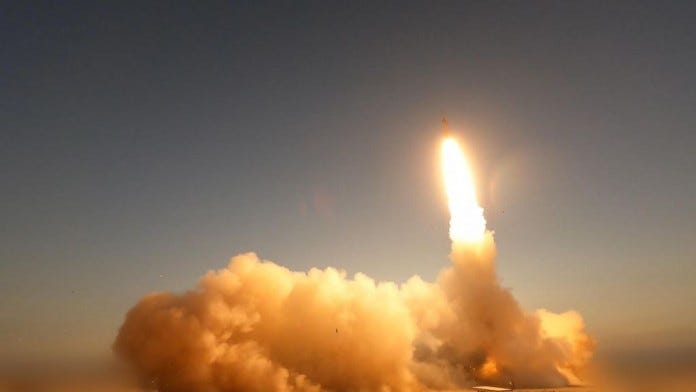
Israel Sees Surge in Space Defence Startups Driven by MoD Collaboration
Israel's defence sector has experienced a significant surge in startup activity, driven by increased collaboration between the Ministry of Defense’s Directorate of Defense Research & Development (DDR&D) and local tech companies. This growth, highlighted at the first International Defense-Tech Summit, saw 86 new defense startups emerge in 2024, receiving a total of $168 million in funding, a fivefold increase from the previous year. These startups are developing advanced technologies in areas such as air and missile defence, cybersecurity, and space capabilities. Notably, Israel’s integration of cutting-edge systems like the Arrow 3 missile defence and Iron Dome has bolstered its defence infrastructure, while the space dimension has become crucial in monitoring global threats and supporting real-time intelligence. The collaboration between startups and defence agencies has strengthened Israel’s military capabilities, reduced reliance on foreign suppliers, and fostered economic growth through innovation. As Israeli defence startups continue to thrive, they are shaping the future of global defense and reinforcing Israel’s strategic relationships, particularly with the United States.
Israel’s SatixFy Reports Q1 to Q3 2024 Financial Results
Israel’s SatixFy Communications Ltd. has reported its financial results for the nine-month period ending 30 September 2024, revealing a 4% decrease in revenues to $8.5 million, primarily driven by product sales of space-grade ASICs. Despite a decline in development service revenues, the company saw a 36% increase in gross profit to $6.2 million, reflecting a shift toward higher-margin products. SatixFy has secured significant contracts, including a $39 million deal with Telesat for the Lightspeed Network, and continues its collaboration with MDA Space Ltd. in space-grade chip technology. The company anticipates increased service revenues for Q4 2024, with full-year revenue projections between $17-$19 million. While facing an operating loss of $23.1 million, a reduction in R&D expenses and improved gross profit contributed to an 18% reduction in the operating loss compared to 2023.
Azerbaijan Space News
Azerbaijan’s Azercosmos Provides Satellite Imagery to Kyrgyzstan to Monitor Climate Risks
Azerbaijan’s Azercosmos, in collaboration with Kyrgyzstan's Ministry of Emergency Situations, has successfully leveraged satellite-based digital solutions to assess and prevent natural disaster risks. Azercosmos provided a high-precision Digital Elevation Model (DEM), which played a critical role in identifying a potential disaster risk from a mountain lake in the Issyk-Kul area. Using satellite imagery and data analysis, Azercosmos detected the risk of the lake breaching and causing widespread flooding, enabling Kyrgyzstan's authorities to evacuate surrounding villages in time. The evacuation saved 500 lives when the flood occurred just days later. This collaboration highlights the importance of satellite data in disaster management, particularly in monitoring mountain lakes, which are increasingly vulnerable due to climate change. Enhanced satellite monitoring and security measures are crucial to mitigating future disaster risks in the region.
Azerbaijan’s Azercosmos Insures Azerspace-1 Communications Satellite
Azerbaijan’s state space corporation, Azercosmos, has initiated preparations for the annual insurance coverage of its telecommunications satellite Azerspace-1, which is currently operational in orbit. The insurance, valued at $1.4 million for the period from 1 February 2025, to 1 February 2026, covers the satellite’s insured value of $53 million. This contract highlights Azerbaijan's commitment to ensuring the continued operation and protection of its space assets, specifically the Azerspace-1 satellite, which plays a crucial role in the country's telecommunications infrastructure.
Armenia Space Developments
Armenia and China Discuss Space Cooperation
Senior representatives from Armenia and China met to discuss enhancing their technological collaboration, focusing on high-tech industries. The talks, led by Armenia's First Deputy Minister of High-Tech Industry, Gevorg Mantashyan, and Zhao Qiuyan from China's Ministry of Commerce, explored opportunities in telecommunications, digitalization, cybersecurity, and the space industry. The Chinese delegation presented a programme for expanding cooperation, particularly around standardisation and certification of high-tech products. Both sides emphasised the potential for joint scientific research and participation in technology exhibitions and agreed to develop a detailed roadmap for future collaboration. The meeting underscored the mutual commitment to strengthening bilateral technological partnerships.
Regulators Grant Starlink Authorisation to Start Satellite Services in Armenia
The Armenian Public Services Regulatory Commission has granted Starlink AM LLC the necessary licenses and permits to operate its satellite-based communication network in Armenia. Minister of High-Tech Industry, Mkhitar Hayrapetyan, confirmed the approval on the 4th and 13th of December 2024, allowing Starlink to use radio frequencies and establish a public electronic communication network via global satellite systems. The service is now entering the testing phase, with Hayrapetyan expressing optimism that it will be fully operational in the coming months. This development marks a significant step in expanding satellite internet access in Armenia.
Other Regional Space News
President Putin Ratifies Algeria-Russia Space Cooperation Agreement
Russian President Vladimir Putin has ratified an intergovernmental agreement with Algeria to enhance cooperation in the peaceful exploration and use of outer space. This agreement, which establishes a framework for collaboration between Russia’s Roscosmos and the Algerian Space Agency, covers a wide range of space-related activities, including space science, planetary research, satellite communications, and Earth observation. It also includes human space operations, space geodesy, meteorology, space biology, and medicine. Additionally, the agreement emphasises joint efforts in space environment protection, space debris mitigation, and legal regulations for space activities. The document outlines provisions for funding, oversight, information exchange, and dispute resolution. Effective for an initial 10-year period, the agreement will automatically renew unless terminated by either party.
Satellite Internet Fueling GCC’s Digital Transformation
Satellite internet is playing a pivotal role in the Gulf Cooperation Council's (GCC) digital transformation, bridging connectivity gaps between urban centres and remote areas. By providing high-speed access to underserved communities, satellite technology is facilitating access to essential services like education and healthcare, particularly in Saudi Arabia’s Vision 2030. It is also boosting small and medium-sized enterprises (SMEs), especially in Bahrain and the UAE, by connecting them to e-commerce platforms and global markets, thereby enhancing competitiveness. Satellite internet is driving the adoption of Industry 4.0 in sectors such as oil, gas, agriculture, and logistics, exemplified by Saudi Aramco’s use of digital technologies for remote monitoring in oil fields. Key players like Starlink, AST SpaceMobile, Lynk, Viasat, and Iridium are transforming the region with innovative satellite solutions for applications ranging from IoT to autonomous vehicles. With continued investments and regulatory support, satellite internet is set to play a crucial role in fostering economic growth, social inclusion, and regional competitiveness in the GCC.
Regional Space Developments in Brief:
Egypt and Poland held economic talks where space cooperation was also discussed;
UAE and India held bilateral economic talks in New Delhi where space cooperation was also discussed;
Azerbaijan and Rwanda held bilateral talks that included space and satellite opportunities for cooperation;
Celebrating Oman-Belarus diplomatic ties, Minsk offers satellite capabilities among other technologies to Muscat.
Be sure to catch up with space activities in the region in the next edition of Middle East Space Monitor’s space roundup!




